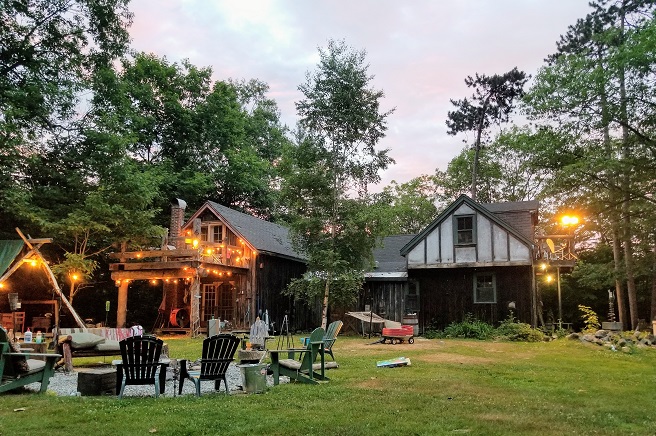We spend so much time and energy on our gardens to create a beautiful, picturesque setting.
But once the sun goes down, all that hard work is hidden from view.
To get more out of your outdoor decor, consider bringing landscape lighting into the equation.
Here, landscaping expert Gary Antosh from Plant Care shares his must-know landscape lighting tips for planning your illuminated spaces.
1. Not Too Bright
Landscape lighting is intended to help you and your family enjoy the beauty of your outdoor decor at night.
Don’t turn it into a daytime view by placing floodlights and spotlights everywhere.
That will create a flat, washed-out look.
Instead, use a number of smaller fixtures, strategically located to illuminate only the most attractive features.
Also adjust fixtures so the bulbs are not in direct view, as this will distract from the object being illuminated.
2. Balance Light & Dark
Position your landscape lighting so you have a balance between areas of light and dark.
Correctly illuminated, a flowerbed, tree or cluster of bushes can have a nighttime beauty all its own.
These features will be more fascinating when surrounded by an area of darkened shadows, providing an interesting contrast.
Plus, unattractive features such as plants out of bloom or a distracting background can be easily concealed in darkness.
3. Be Inconspicuous
You and your guests should be no more aware of the source of landscape lighting at night than you are of the source of daylight.
This can be more difficult with solar lighting fixtures, since solar batteries need to be recharged during the day.
Try to find an out of the way place that still gets sunlight, or go with low-voltage lights instead.
Besides making certain that your landscape lighting doesn’t shine into your eyes, make sure it doesn’t shining into your neighbor’s eyes too.
4. Look Up
Since natural light almost always comes from above, the bulk of your outdoor lighting should come from the same direction, the higher the better.
5. Low Wattage
Use comparatively low-wattage floodlights for overhead lighting, never any bulbs larger than 100 watts.
Consider low-voltage lighting wherever possible.
6. Spotlights
Use spotlights sparingly and for accent lighting only.
Landscape spotlights are good at highlighting an otherwise evenly illuminated scene or to point out an interesting detail or feature such as a pool.
7. Smaller Side Lighting
When lighting a large flowerbed or other planting area, use a number of smaller lights rather than a single large unit.
This will create a series of softly overlapping pools of light that are free of harsh glare in the center.
Very little of your landscape lighting should be front lighting.
Regardless of whether the light comes from above or below, most of it should be directed from the sides.
Also try to have more light coming from one side than the other, which will result in better modeling and give off an interesting shadow effect.
While side lighting is often your best bet, feel free to experiment with back lighting for interesting silhouette effects.
8. Silhouettes & Focus
Choose to light more solid objects, which will be illuminated more effectively than thin, skeleton-like structures.
Avoid lighting bare trees, open trellises and the like.
Select a focal point or center of attraction for each lit area, and highlight it with additional brightness to point out its most attractive features.
Use one or two spotlights, or a light coming from an unusual angle, such as straight up.
9. Get Reflective
Make full use of light-colored reflective surfaces in your landscape lighting scheme.
Light-colored walls and fences will often help extend the source of illumination by reflecting and diffusing the rays of light over.

